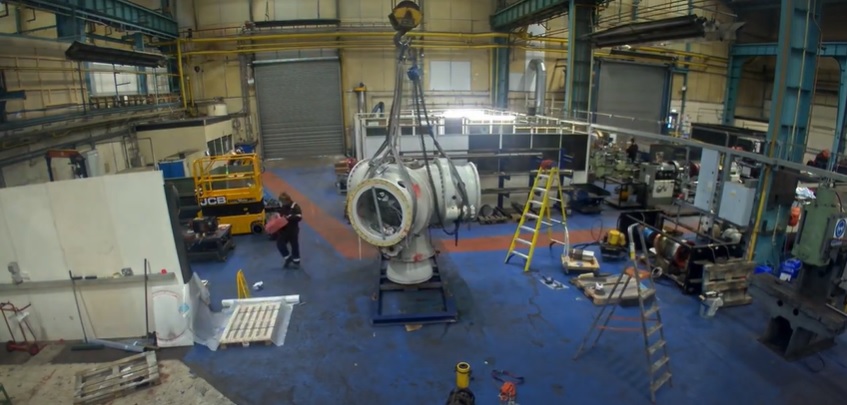R&D Test Systems Completes Foundation for new Test Bench: Main Bearings for 25 MW Wind Turbines

Nine months into building the most powerful test bench for main bearings to date, R&D Test Systems, Denmark’s wind turbine test specialist, has completed the 3,700 metric ton foundation and is now designing and welding the test bench parts that will perform extreme test loads on main bearings for 25 MW wind turbines. With delivery in 2025, the test bench is bound for LORC’s new main bearing test facility.
“It’s in recognition of our large-scale testing capability that LORC has selected R&D Test Systems to build the most powerful test bench for main bearing arrangements. The foundation is complete, and our engineers have designed the systems that will apply the actual loads to simulate not only the harshest forces of wind but also the effect of wind coming from different directions,” says Peter Winther, key account manager, R&D Test Systems.

Critical to ensuring the turbine operates smoothly and efficiently, the main bearing supports the main shaft, keeping it stable and properly aligned. It also transfers the loads caused by the rotor blades to the turbine structure and allows generated torque to transfer to the gearbox and generator. To test and validate large main bearings, the new test bench will apply loads that simulate real-life wind conditions in an accelerated manner.
“The main bearings take the impact of the rotor load and so must be able to withstand any extreme wind load scenarios that could occur with wind turbines as powerful as 25 MW. Our tests will include twisting and bending in all six degrees of freedom,” adds Winther.
Powerful test load unit
An essential part of the test bench is R&D Test Systems’ proven “test load unit”, which will be able to deliver extreme bending and forces to the main bearing arrangement under test. Capable of supplying six axial loads to the main bearing arrangement - thrust, horizontal and vertical forces as well as torque, tilt and yaw moment – the test load unit will be able to apply bending loads of more than 100 Mega Newton meters and thrust force of more than 10 Mega Newton meters. The test load unit enables the test bench to simulate the effect of years of wind conditions in just a few months.
“The test load unit that we are building for LORC’s new Main Bearing Test Facility will be the largest and most capable that R&D Test Systems has developed. This will be the sixth test load unit we build after completing the powertrain validation test bench at ZF Wind Power’s ‘Test & Prototype Center’ in Lommel, Belgium,” says Winther. With a length of 35 meters and a height of 18 meters, the test bench will be the longest of any of the LORC’s test bench facilities at Odense Harbor in Denmark.
Testing sub-systems
In the future, more powerful turbines will be equipped with larger, heavier sub-systems in the nacelle, like the main bearing, which must withstand extreme loads and therefore require tests. Concentrating on the main bearings, the test bench allows wind turbine manufacturers to conduct tests for this system in isolation rather than as part of a full powertrain test procedure.
The test bench will be designed to test both geared and direct-drive main bearing arrangements, the two principal bearing systems for wind turbines. Furthermore, it is designed with a flexible, upgradeable design to enable the testing of future bearing technologies.
A team of 35 full-time engineers started work on the test bench at R&D Test Systems' headquarters in Denmark early this year. In addition to electrical, systems, software, and mechanical engineers, the project will draw on civil engineering expertise to construct the reinforced concrete foundation strong enough to withstand extreme wind loads during tests. LORC contracted R&D Test Systems to build the test bench for main bearings at Odense Port, Lindø, Denmark. The project received a 10 million Euro grant from the Danish GreenLab program.
Due for delivery in 2025, the test rig will be depicted at R&D Test Systems’ stand B1.EG.410 at WindEnergy Hamburg, 24-27 September 2024.





